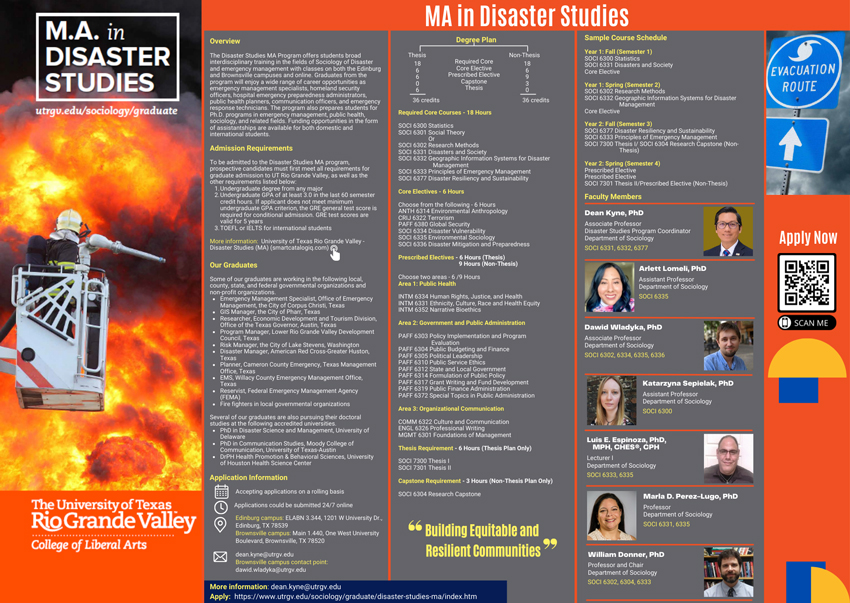Welcome to Disaster Studies
Natural and technological hazards pose increasing risks to the health and economic security of communities in the Rio Grande Valley and elsewhere in the United States, resulting in a growing need for trained emergency management professionals. The M.A. Degree in Disaster Studies at UTRGV provides students with critical training and experience in the field of emergency management to assist in preparing for and managing disasters when and where they occur. Offered on both the Edinburg and Brownsville campuses, the program is designed to accommodate the needs of professional students with coursework offered both online and evenings. Graduates from the program will enjoy a wide range of career opportunities as emergency management specialists, homeland security officers, hospital emergency preparedness administrators, public health planners, communication officers, and emergency response technicians. For those planning careers in research and teaching, the program also prepares students for Ph.D. programs in emergency management, public health, and related fields. Funding opportunities in the form of assistantships are available for both domestic and international students.
Welcome to Disaster Studies MA Program
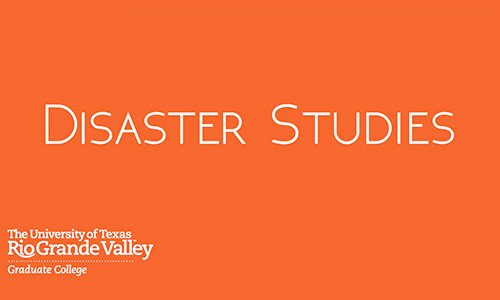
(Video coming soon)
Welcome to UTRGV
UTRGV Alma Mater
Admission
To be admitted to the Disaster Studies MA program, prospective candidates must first meet all requirements for graduate admission to UT Rio Grande Valley, as well as the other requirements listed below:
- Undergraduate degree from any major
- Undergraduate GPA of at least 3.0 in the last 60 semester credit hours. If applicant does not meet minimum undergraduate GPA criterion, the GRE general test score is required for conditional admission. GRE test scores are valid for 5 years
- TOEFL or IELTS for international students
For more information on the degree plan see the embedded iframe or view the smart catalog on this link: The University of Texas Rio Grande Valley - Disaster Studies (MA) (smartcatalogiq.com)
Our Graduates
Some of our graduates are working in the following local, county, state, and federal governmental organizations and non-profit organizations.
- Emergency Management Specialist, Office of Emergency Management, the City of Corpus Christi, Texas
- GIS Manager, the City of Pharr, Texas
- Researcher, Economic Development and Tourism Division, Office of the Texas Governor, Austin, Texas
- Program Manager, Lower Rio Grande Valley Development Council, Texas
- Risk Manager, the City of Lake Stevens, Washington
- Disaster Manager, American Red Cross-Greater Huston, Texas
- Planner, Cameron County Emergency, Texas Management Office, Texas
- EMS, Willacy County Emergency Management Office, Texas
- Reservist, Federal Emergency Management Agency (FEMA)
- Fire fighters in local governmental organizations
Several of our graduates are also pursuing their doctoral studies at the following accredited universities.
- PhD in Disaster Science and Management, University of Delaware
- PhD in Communication Studies, Moody College of Communication, University of Texas-Austin
Desiree Padilla
Hi, my name is Desiree Padilla. I am an RGV native, graduated with my Bachelors in Biology and minors in chemistry and English in 2016 from UTRGV. And I am about to graduate with my Masters in Disaster Studies this Spring 2021. As a valley native I have witnessed how cohesive communication and planning during disasters has been the “make it or break it” factor within my community, and I wanted to become a part of this impact. The UTRGV Master's program in Disaster Studies has opened the doors of emergency management for me, and because of the connections I have made and the opportunities I gained from this program I have been able to put what I have learned to the test in the real world. Last semester I was able to use my GIS skills by working with the UTRGV Alzheimer's Disease Resource Center for Minority Aging Research (or RCMAR). And this semester, through my capstone course I have been interning at the Willacy County EMS where I am now officially employed as part of their emergency management team and have been helping with the COVID-19 vaccination clinics as one of their COVID-19 vaccination coordinators. The UTRGV Master Program in Disasters Studies is fairly new but its growing and I know I am one of many that is excited to see what the future of emergency management will look like with those from UTRGV leading!
Go vaqueros!
Raymundo Gonzalez
Hello, my name is Raymundo Gonzalez, I am a student of the UTRGV Master of Arts in Disaster Studies program and graduate class of 2021. I have been employed as a FEMA reservist for the last 3 years, working in their Individual Assistance cadre. My work involves traveling across the country and helping those directly impacted by disasters. The Disaster Studies program at UTRGV has allowed me to apply academics into practice in real world scenarios. There is a growing need for disaster and emergency management professionals. If you are interested in a very rewarding career with a chance to make a positive impact on your community, I highly encourage you to apply to the Disaster Studies program.
Good luck and best wishes.
Raymundo Gonzalez
Deepa Acharya
Hi, My name is Deepa Acharya. I am currently doing my Master’s in Disaster Studies Program at UTRGV. I am an international student from Nepal. The disaster Studies program at UTRGV prepares local and international students to work in the professional field after graduation. I enjoyed and learned so much from the diverse style of teaching and learning practices applied by the faculties. Meeting emergency managers from different cities and counties, hearing their disaster preparedness, response and recovery experiences and plans were some of my favorite parts of the program. These hands-on experiences gave me solid knowledge and confidence to work after I graduate. Since Spring 2021, I am doing an internship with a Washington DC-based international development company known as the Kaizen Company. I'm supporting some of the USAID-funded projects to advance peace and democracy and capacity development in Niger, Georgia and Jordan. Thanks to UTRGV and the program for preparing me to work in Global settings within the field of disaster, crisis, emergencies including development. Thank you again.
Gerardo Zubieta
Hello, UTRGV. I am Gerardo Zubieta, and currently I am employed at a non-profit organization with a role in Quality Management and Quality Assurance activities. I am graduate student enrolled in the Disaster Studies Masters program with a Spring 2022 graduation date. I invite you to explore the wonderful Disaster Studies program offered by our talented professors at UTRGV. What interested me about the program was that it prepares you to go into a growing field that is Disaster Management. Disasters can come in many different forms and the courses provided offers the students the knowledge needed for the many aspects of disaster management. From preparedness to response and recovery activities, and assessing for vulnerability to mitigation, the Disaster Studies program challenges you to think critically on how socioeconomic factors influence how disasters are experience by different groups. Even in my current line of work, I have been able to implement what I have learned to improve in the role I am in. Additionally, the program offers elective courses in public administration, public health, and management among others. Again, I invite to explore the Disaster Studies program here in UTRGV.
Ashrafuzzaman Nazim
Hello Everyone. My name is Ashrafuzzaman Nazim. I am a master’s student in the Disaster studies program at The University of Texas Rio Grande Valley (UTRGV). I have also taken my bachelor's degree in Disaster Management from the University of Dhaka. Here in UTRGV I am working as a graduate teaching assistant at the department of sociology under the supervision of professor Dr. Dean Kyne. I am very lucky to share with you that I was awarded a graduate sustainability fellowship. Under my fellowship, I am working on a project, my project name is evacuation preparedness plan for the Rio Grande Valley area. My project's main goal and aims are how to reduce the impacts of environmental, social, and economic impacts of the upcoming hurricane in the Rio Grande Valley as well as any kind of natural disasters. UTRGV’s master’s program in disaster studies have a wonderful curriculum. It includes some courses like GIS, Emergency management, and statistics. Those who are preparing themselves for higher education in emergency management and disaster science, in addition to those who would like to pursue their career in emergency management, UTRGV’s master’s program will help a lot. Unfoundedly this is the best master’s program in disaster management. Best of luck with your interest in disaster and emergency management. Thank you, everyone.
Carlos Escobedo
Hello, My name is Carlos Escobedo and I am a Graduate Student at the University of Texas Rio Grande Valley with the Disaster Studies program Class of Fall 2022. I am a full-time professional firefighter and emergency medical responder of the Harlingen Fire Department. I am currently in probationary status but will soon be completing my 18 months this upcoming December. I started Harlingen’s Fire Academy in the summer of 2020 while at the same time starting the Disaster Studies program. Starting both the graduate program and fire academy during the ongoing COVID-19 pandemic was a challenge I proposed myself to do after witnessing how the pandemic greatly impacted our local communities. It was through the Disaster Studies program that I learned the fundamentals of emergency management and the history of how this field came to be. At the same time, I was learning about the Incident Command System, the National Incident Management System and other FEMA Emergency Management Institute Independent Study Courses that I was required to take as part of my employment with the fire department. The “All-Hazards Approach” in emergency management is what intrigued my passion to continue learning how well our community is prepared for the unexpected such as the February Winter Storm that greatly impacted many. As a firefighter, we protect life and preserve property during emergencies and other catastrophic events using the “All-Hazards Approach” discipline. And we don't just focus on fire suppression, we also train to respond to rescues (including animal rescues), HAZMAT situations and to medical calls. I have to say that my favorite part of my job is when we engage with the community and promote fire safety education and other civic engagement that help us build interpersonal relationships with our community. My goal is to expand my knowledge and skills as a front-line first responder to then work my way up as an emergency management coordinator in the Rio Grande Valley.
Alum Brianna Bautista
Alum Brianna Bautista puts lessons learned into action in fight against COVID-19
Editor’s Note: During these unprecedented times, as we continue to deal with the COVID-19 pandemic, there are UTRGV faculty, staff, students and alumni who are making history. Without hesitation, they are stepping up to the front lines of the outbreak to help mitigate the spread of the virus throughout their communities. The Newsroom at UTRGV is recognizing the efforts and bravery of these individuals through an ongoing series of stories and videos.
By Amanda Taylor
Brianna Bautista earned her master’s degree at UTRGV in Disaster Studies in fall 2019. It takes a certain kind of person to remain calm when disaster strikes, to stave off panic in themselves and in others. Those who work in emergency management surge forward with carefully laid out plans and procedures, ready to serve amidst spiraling chaos. Brianna Bautista, a UTRGV alum who got her master’s degree in Disaster Studies in fall 2019, knew she wanted to help people by helping mitigate disaster. So, after graduating from UTRGV, she put her skills to immediate use by going to work as an aide in the Office of Emergency Management in the Corpus Christi Fire Department. She started that job in March – right when the COVID-19 pandemic was ramping up.“That was an interesting way to start,” she said, looking back at 10 months of pandemic.“COVID had hit hard here in Corpus Christi and we were just trying to keep in touch with the police department, members of the fire department, trying to see how everyone was doing and what their plans were,” she recalled. Bautista, whose position was upgraded to emergency management specialist in August, should have been prepping to give presentations to her community on hurricane preparedness, especially since hurricane season was just around the corner. Instead, her department was taking call after call from concerned residents or fellow community service departments, all asking for information on the strengthening pandemic. “That first day when I came in, it was just phone call after phone call that Billy Delgado, my coordinator, was receiving. My main role was just to make note of all the calls coming in and what people were saying,” she said. “This is my first job, so it reminded me of being in school, when you have to take notes superfast and you’re under pressure.”
Prepared to Handle Crisis
Today, Bautista works closely with her department to make sure her office is prepared for anything surrounding community agencies may need. Her responsibilities include reviewing emergency preparedness plans for nursing homes and assisted-living facilities, and processing re-entry requests, which are the documents needed from organizations to safely re-enter a hazardous area in the event a hurricane or other disaster. In her new role of emergency management specialist, Bautista also is responsible for writing annual reports for her office, drafting incident action plans (IAPs) and making sure her office submits all Emergency Management Performance Grants (EMPG) documents. She said she went into her first job in emergency management prepared, knowing she had the tools she had learned in her UTRGV disaster studies classes. “The program was awesome. All the professors were super kind and always there for you,” she said. “All the students formed a bond and became a family. Everything I’m doing here, I learned at UTRGV. I get to see it in action.” Whether it’s a concerned citizen calling to get information on the latest COVID-19 testing site, or a nursing home wanting to update its emergency plans, Bautista said, communication is the number one priority. I like the communication that we all have,” she said. “We all work together and come in as one. The goal that everyone has is there, and it’s always the safety of others. We’ve really seen how everyone is working together through this COVID-19 situation.” Within the field of emergency management, she said, a broad spectrum of jobs is available at the local, state and federal levels. What drew her to the field was that, potentially, she could help stop a disaster before it happens. “I’m thankful for UTRGV and what it instilled in me, and I’m thankful for all my professors and my mentors,” she said. “I’m glad that I got into the program that I did and met the people that I did. “Even in our class settings, we were all about communicating with one another, having a goal in mind and all working toward it. That’s something that is very critical in emergency management,” she said.
Original Article:
The Newsroom - Alum Brianna Bautista puts lessons learned into action in fight against COVID-19 (utrgv.edu)
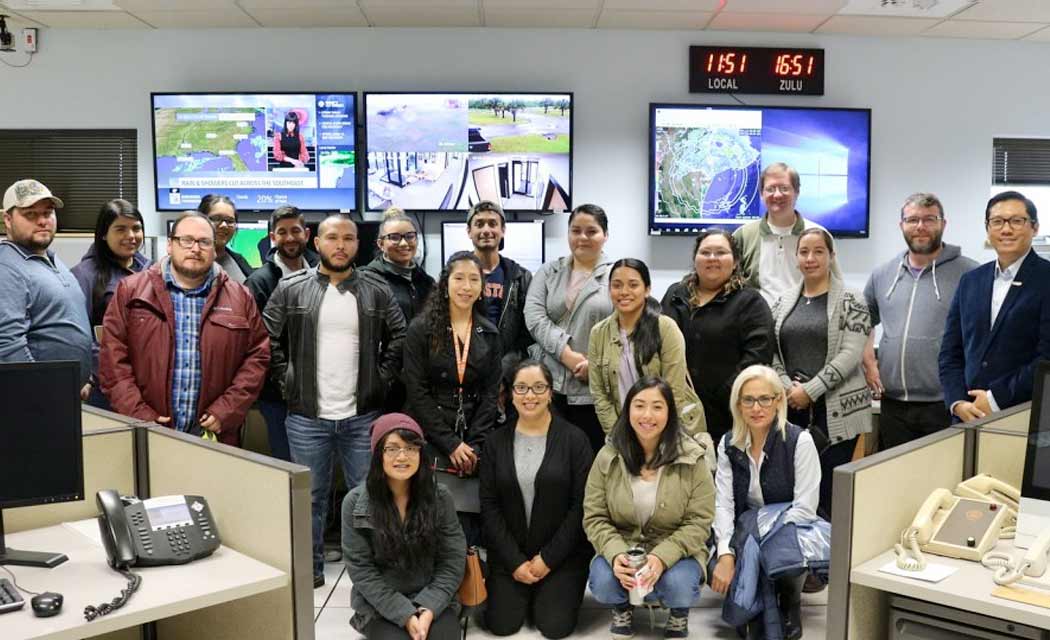
As a Disaster Studies student at UTRGV, Brianna Bautista, now an alumna, visited the National Weather Service Center in Brownsville along with her fellow classmates. (Courtesy Photo)
Careers
Careers in Emergency Management
Graduates from the program will enjoy a wide range of career opportunities as emergency management specialists, homeland security officers, hospital emergency preparedness administrators, public health planners, communication officers, and emergency response technicians. The program also prepares students for Ph.D. programs in emergency management, public health, and related fields. Funding opportunities in the form of assistantships are available for both domestic and international students.
State and national level data strongly suggest that there will be significant growth in demand for trained specialists in Disaster Studies. For example, the Texas Workforce Commission projects 20% growth in disaster/emergency management employment opportunities through 2020. Furthermore, training in the proposed program may also be a vehicle for career advancement for public sector employees that are not directly involved in disaster or emergency management. Given that government is the single largest employer in the RGV, this can be an important source of enrollment for the program while also benefiting the community.
At the national level, The U.S. Bureau of Labor Statistics projects 8%-14% growth in the number of job openings for Emergency Management Directors. U.S. News and World Report listed Emergency Management as one of the top 50 best jobs in terms of growth through 2020.
Careers in Disaster Relief
by Elka Torpey | July 2018
Sara Hicks-West understands disasters. As a disaster director for the American Red Cross, she plans for and responds to hurricanes and other catastrophes. “It’s a very stressful environment,” says Hicks-West of working in the wake of a natural disaster.
But the job has its rewards, too. “To go into a shelter and know that there are individuals who are safe because of all the work you’ve put in, there’s great satisfaction in that,” she says.
People who work in disaster relief have a variety of jobs, but they all have a common mission: ensuring that when disaster strikes, help follows. Keep reading to find out more about careers in disaster relief.
Phases of Relief Work
Some workers, like Hicks-West, have full-time positions with a primary focus on disasters. Others have relief-related training or specialized skills but work full time in another job and are on call to help when disasters occur. And many other people volunteer or work in temporary jobs that last only until recovery efforts are complete.
Disaster relief work is commonly divided into four phases: preparedness, response, recovery, and mitigation.
- Preparedness. During the preparedness phase, disaster relief workers develop and refine emergency response plans. They also conduct training exercises to get ready for a variety of possible scenarios.
- Response. When disaster strikes, and in the days and weeks that follow, relief workers coordinate logistics for carrying out response plans. Workers take action to save lives, preserve property, and provide humanitarian care. They evacuate affected areas; set up shelters; restore power and repair other critical infrastructure; and deliver food, medicine, and other supplies.
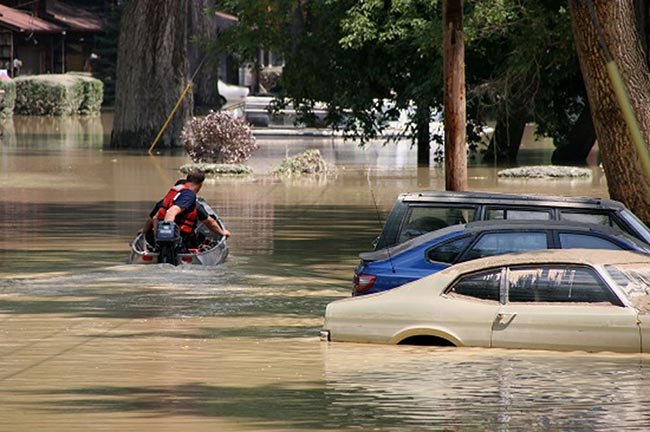
- Recovery. After meeting people’s immediate needs and restoring basic services, disaster relief workers help with economic recovery—including helping people get funding for repairs. Recovery workers help to address housing, health, and social services needs and assist in rebuilding communities.
- Mitigation. To prevent or reduce damage from future disasters, relief workers do a variety of tasks in the affected community. These tasks include assessing possible weaknesses, taking steps to strengthen infrastructure, and educating the public about ways to lessen risks.
Employment
Emergency management agencies at the state and local level usually have a primary role in providing disaster relief in their communities. These agencies may be assisted by the federal government, nonprofit organizations, and, in some cases, private companies.
Among the federal agencies involved in coordinating disaster relief services are the Federal Emergency Management Agency (FEMA) and the U.S. Army Corps of Engineers. According to the U.S. Office of Personnel Management, those agencies employed 34,070 and 17,730 workers, respectively, in 2017.
BLS counts employment in nonprofit and private groups that provide relief under the “emergency and other relief services” industry (also referred to in some BLS data as the “community food and housing, and emergency and other relief services” industry). As chart 2 shows, employment in this industry more than doubled between 1990 and 2017, with continued growth projected through 2026.
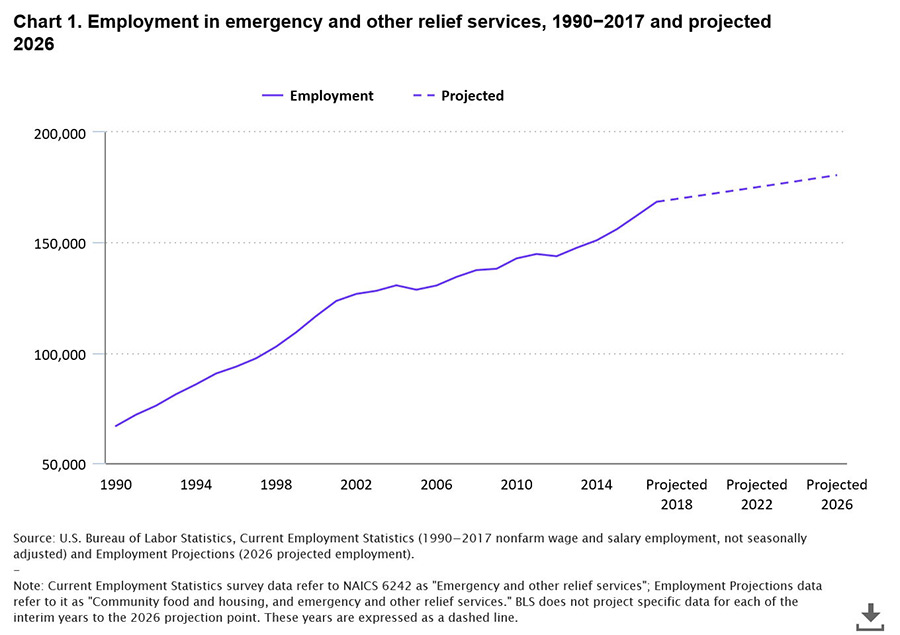
Workers in community food and housing, and emergency and other relief services include those in management, community and social service, and delivery occupations, among others. Table 1 shows selected occupations for which BLS has data, sorted by 2017 median annual wage. (Compare wages in the table with $37,690, the median annual wage for all occupations in 2017.) Employment growth in relief services occupations is projected to be faster than the average for all occupations from 2016 to 2026.
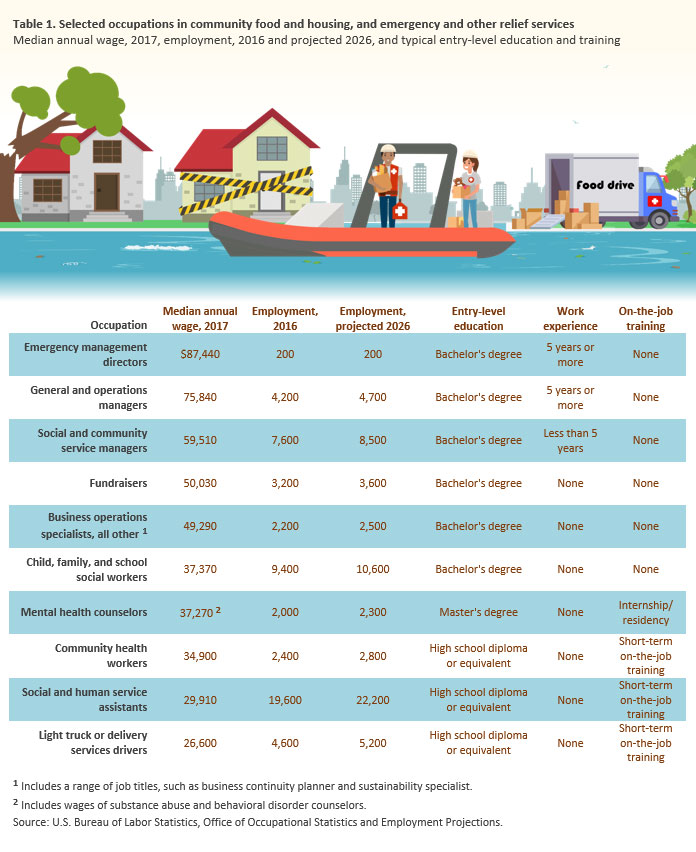
Keep in mind that occupational data in the table are for a single industry and do not reflect all disaster relief employment. For example, less than 2 percent of emergency management directors are employed in community food and housing, and emergency and other relief services. Most emergency management directors work in government, with the remainder employed across several other industries, including hospitals and utilities.
Pros and Cons
In many ways, disaster relief work is unique. Workers may be on call for days or even weeks. And they must be prepared to travel on short notice—and expect long workdays of indefinite stay when they arrive.
Working conditions at a disaster site may be difficult because of both physical challenges, such as a lack of running water, and emotional ones, such as processing the sight of death or large-scale destruction.
Knowing that people’s lives and well-being may be at risk, along with the uncertainty of the disaster’s aftermath, adds to the stress of the work. “You do the best you can, but it might not always be enough,” says John Osborn of the National Disaster Medical System, a federally coordinated healthcare team.
However, a career in disaster relief can also be rewarding. People say they are drawn to relief work because they enjoy the challenges of responding to emergencies and the ambiguity that goes with it. They also like that no 2 days are alike, which keeps the work interesting.
Some workers find it inspiring to see varied groups and people coming together during a crisis to achieve a common goal. “It’s really rewarding to figure out that puzzle, to think on your feet and work with a team of people who are all aligned for that same purpose,” says Osborn.
Perhaps the most gratifying thing about relief efforts, workers say, is having an opportunity to improve the lives of people who may be in difficult, even desperate, situations. “There’s a direct connection,” says Laura Wolf, chief of the critical infrastructure protection branch at the U.S. Department of Health and Human Services, “between helping people and making sure that lives are saved.”
Preparing for a Career
The education, experience, and training typically required to enter occupations related to disaster relief differs, as table 1 shows. But some skills and preparation are common among these workers.
For example, workers usually must have problem-solving skills and be able to adapt to changing scenarios—one relief event at a time. “Every disaster is unique,” says Wolf. “There are standard operating procedures, but the disaster is always going to challenge those. You have to think on your feet and be mentally resilient.”
Good communication and relationship-building skills are valuable, too, because disaster relief workers often coordinate with teams or individuals from both within and outside their own organization.

Disaster relief workers may choose to complete formal programs in emergency or disaster management, especially at the bachelor’s- and master’s-degree levels. Other credentials, such as the Certified Emergency Manager and the Certified Business Continuity Professional designations, may be required or preferred for some jobs. Still other training options may be available either in person or online, such as free courses offered by FEMA.
Many people learn different facets of relief work on the job, through experience in related positions, or by volunteering. For example, serving in the military, protective service, or certain healthcare occupations, such as EMTs and paramedics, provides a good foundation for dealing with emergencies.
Experiential learning is valuable preparation for any career, but it’s especially important in disaster relief. “You learn by doing, so you need to try as early and as often as you can to go to disasters,” says John Fredenberg, who works at the Centers for Disease Control and Prevention Division of Strategic National Stockpile. “In our field, lives literally hang in the balance.”
For More Information
Learn more about the occupations in this article—and hundreds of others—including what workers do, what their job outlook is, what their entry-level education and training requirements are, and more in the Occupational Outlook Handbook.
Related Career Outlook articles include:
Working for the federal government
Helping those in need: Human service workers
Elka Torpey is an economist in the Office of Occupational Statistics and Employment Projections, BLS. She can be reached at torpey.elka@bls.gov.
Apply Now
Application Deadline: Applications are accepted on a rolling basis.
Application Submission: Applications could be submitted online.
Edinburg campus: ELABN 3.344, 1201 W University Dr., Edinburg, TX 78539
Brownsville campus: Main 1.440, One West University Boulevard, Brownsville, TX 78520
More information: Dr. Dean Kyne at dean.kyne@utrgv.edu
Brownsville campus contact point: Dr. Dawid Wladyka at dawid.wladyka@utrgv.edu
Graduate Admissions
Gualberto “Wally” Garcia
Graduate Admissions Officer
gualberto.garcia@utrgv.edu
956-665-3704
Graduate Recruiting
Stephanie Ozuna Larralde
Director of Graduate Recruitment and Outreach
stephanie.ozuna@utrgv.edu
956-665-3558
Please check updated information on contact persons and their emails at the graduate college website!
Tips About Getting Into Graduate College
International Admissions at UTRGV
Faculty Members

Dean Kyne, PhD
Professor
Disaster Studies Program Coordinator
dean.kyne@utrgv.edu
Phone: 956-665-2572
Edinburg, ELABN 343
Specialization: Disasters, sustainability, environmental justice, nuclear power disasters, GIS
Profile Link

Arlett Lomeli, PhD
Associate Professor
arlett.lomeli@utrgv.edu
Phone: 956-665-3318
Edinburg, ELABN 350
Specialization: Race/ethnicity, gender, criminology, ecofeminism, disasters, education
Profile Link

Dawid Wladyka, PhD
Professor
dawid.wladyka@utrgv.edu
Phone: 956-882-7384
Brownsville, Main 1.434
Specialization: Sustainability, Disasters, Migration, Diversity, Ethnic Relations, Urban/Rural Studies, Field Research Methodology, GIS
Profile Link

Katarzyna Sepielak, PhD
Associate Professor
katarzyna.sepielak@utrgv.edu
Phone: 956-882-7384
Brownsville, Main 1.434
Specialization: Cross-cultural communication, Accessibility in emergency management, Risk and conflict communication, Audiovisual translation, Language in field research, Quantitative methods, Mass media, Medical interpreting
Profile Link

Marla D. Perez-Lugo, PhD
Professor
marla.perezlugo@utrgv.edu
(956) 665-8160
Edinburg, ELABN 353
Specialization: Environmental Sociology
Profile Link

William Donner, PhD
Professor & Department Chair
william.donner@utrgv.edu
(956) 665-2367
Edinburg, ELABN 344A
Specialization: Environmental sociology, disasters, demography, quantitative methods, statistics
Profile Link
Staff

Jesus "Jesse" Medina
Administrative Assistant II
jesus.medina@utrgv.edu
956-665-8723
Edinburg, ELABN 344







